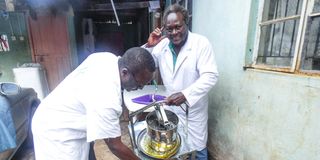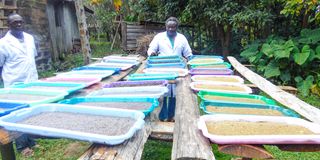Premium
Retired school teacher churns out avocado value addition enterprise

Mr Mutegi and his son Martin Mwenda demonstrate how they make avocado oil at their enterprise in Tharaka Nithi.
What you need to know:
- In his processing, he started with a manual production process where no chemicals, machines, electricity or fossil fuel was used. He just needed his hands and some basic utensils.
- In processing the avocado oil, which is the main product, the retired primary school teacher extracts the pulp from the avocado and smashes it to get a paste.
- In making the avocado fuel flakes, Mr Mutegi follows the same procedure as in the case of cooking oil, but in this case, utilises the rotten avocados.
- When burning the avocado flakes, another product, bitumen (tar), is formed. The thick black liquid forms at the bottom of the stove.
Edward Mutegi’s five-acre farm at Kanoro village in Tharaka Nithi County is a small forest of avocado trees, which he has grown for 37 years now.
At his farm, the sun is the ultimate resource while avocados are the crucial produce that despite their condition — good or rotten, variety or stage of growth — are just as precious.
Mr Mutegi converts them into cooking oil, hair and body oil, fuel oil, lubricating oil, bitumen (tar), grease, animal feeds among other useful products, an idea he actualised in the year 2018 after grappling with multiple losses and waste during every harvesting cycle.
“During harvesting, the losses were overwhelming as middlemen underrated the value of the produce,” attests the 63-year-old father of three.
Rotting avocados due to lack of buyers became the norm, and Mr Mutegi says he had to think out of the box to save his community.
Adding value became more appealing, and in 2018 he started by collecting the good avocados, cleaning them and using his home utensils in processing avocado oil.
In his processing, he started with a manual production process where no chemicals, machines, electricity or fossil fuel was used. He just needed his hands and some basic utensils.
His simple processing though proved a challenge as it was quite involving and consumed a lot of time. The endeavour also failed him during the rainy seasons, as he could not get enough sunlight to dry his produce.
To overcome some of the challenges, Mr Mutegi made some machines at an approximate cost of Sh8,000 to help him squeeze the oil and package it with ease.
The main product
Mr Mutegi turns bad avocado oil into feedstock for making biodiesel and glycerine as a by-product of biodiesel making process. The products cost between Sh250 and Sh300 depending on the quantity.
In processing the avocado oil, which is the main product, the retired primary school teacher extracts the pulp from the avocado and smashes it to get a paste.
He then spreads the paste on plastic trays with a thickness of between five to six millimetres and lays it under the sun for it to attain a brown colour and eventually a granular form.
The trays’ contents are then transferred into a squeezing machine, while still warm where the oil is squeezed into a clean container.
During the interview with Powering SMEs, Mr Mutegi disclosed that in a good day, he processes up to five litres of oil.
According to the entrepreneur, a kilo of avocados — approximately two medium-sized fruits — can yield up to 300 millilitres of oil depending on the avocado variety.
“The good thing is that I have avocados almost in all seasons, and so guaranteed some good weather I can process all year round,” Mr Mutegi said, further explaining that if he managed a solar drier his processing could even be more efficient.

Mr Mutegi with his son Martin Mwenda at the area where they dry the avocados before processing.
In making the avocado fuel flakes, Mr Mutegi follows the same procedure as in the case of cooking oil, but in this case, utilises the rotten avocados.
“Here, the oily pulp is not pressed to release liquid oil. Instead, it is made into oil flakes which can be used as fuel in a furnace or in an improvised stove,” he says.
When the pulp is spread on the trays, it is exposed to the sun for three to four days, then turned over to allow the underside to dry and turn brown.
The result is an intact piece of oily pulp which is then broken down into smaller pieces or flakes, after which it is ready to be used as fuel,” he explains.
Other products
According to him, the fuel flakes have the potential to substitute firewood, charcoal and kerosene thus having a positive impact on the environment.
He sells a kilogramme of fuel flakes at Sh50.
When burning the avocado flakes, another product, bitumen (tar), is formed. The thick black liquid forms at the bottom of the stove.
The liquid according to Mr Mutegi can be used as a wood preservative and can also be thinned with an organic solvent and used as an organic pesticide.
In making the lubricating oil, bad and rotten avocados are utilized following the same procedure as in making cooking oil, only that this time, separate equipment is used.
Once lubricating oil has been made, it is further heated together with candle wax until the latter reaches its melting point with the mixture being stirred continuously till it cools. The mixture formed is grease.
Other products extracted from avocados by the creative investor are animal feeds, which he makes by utilising the husks, the pits (seeds) and the dry pulp residue that remains in the extraction of cooking oil.
Mr Mutegi has two employees and feels that more people should go into value addition to avoid losses. Every time he sees any part of avocado dumped anywhere, he sees lost gold.





